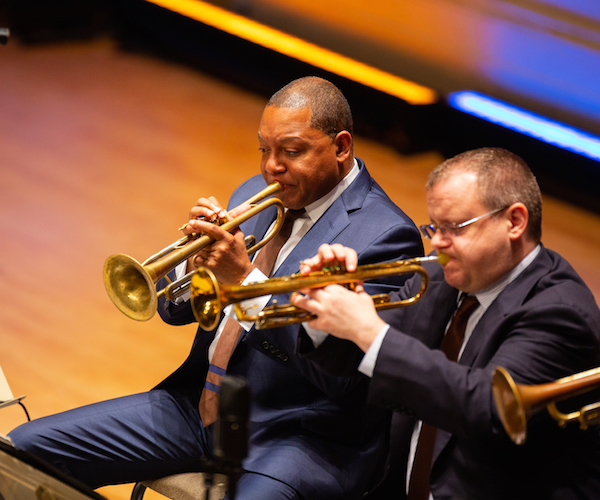Concert Review: Jazz at Lincoln Center Orchestra with Wynton Marsalis
The show had an undercurrent that brought to the fore all the issues that have put Wynton Marsalis at the center of the culture wars.
Jazz at Lincoln Center Orchestra with Wynton Marsalis, presented by Celebrity Series on June 10 at Symphony Hall, Boston, MA

Wynton Marsalis and the Jazz at Lincoln Center Orchestra in action at Symphony Hall. Photo: Robert Torres.
By Jon Garelick
Who but Wynton Marsalis can play two hours of “The Music of Duke Ellington” and make it all about himself?
Maybe that’s a bit unfair. Marsalis is a virtuoso player and a showman. When the Jazz at Lincoln Center Orchestra packs Symphony Hall for one of their annual shows presented by the Celebrity Series of Boston (as they did June 10), it’s Wynton’s photo that’s on the posters. And, give him credit, Marsalis knows how to ingratiate himself with an audience, with between-song banter that was learned, articulate, and laced with amusingly humble brags.
But the show had an undercurrent that brought to the fore all the issues that have put Marsalis at the center of the culture wars since he first emerged on the scene as a young star in Art Blakey’s Jazz Messengers, 40 years ago. More accurately, Marsalis put himself at the center of those culture wars, delivering verbal broadsides about what was or wasn’t jazz. More recently, he dumped on hip-hop as modern minstrel music.
Still, there were plenty of reasons to cue up for this show. Whatever else can be said about Marsalis, he can play, and he can write. So here was America’s first Pulitzer Prize-winning jazz composer playing the music of a man famously denied that honor.
And the program was a rich survey, with the “hits” as well as obscure numbers, from the 1927 “East St. Louis Toodle-Oo” to selections from the lesser-played Ellington suites of the composer’s later years and the equally underplayed 1940 chestnut “Jack the Bear.” When Marsalis introduced a piece written for Ellington by the Cuban trombonist Juan Tizol, it wasn’t “Caravan,” but a ripping version of “Moon Over Cuba.” When Marsalis introduced one of Ellington’s “lady” songs, it wasn’t “Sophisticated Lady,” but the form-bending, impressionistic (and gorgeous) “Lady of the Lavender Mist.”
The aggregate of these pieces (there were 14) reinforced Ellington’s reputation for variety and depth. I remembered hearing the Jazz at Lincoln Center Orchestra play one night a few years ago at the Newport Jazz Festival; it was a section from Marsalis’s Pulitzer-winning “Blood on the Fields,” and I thought something that should be obvious, but had never occurred to me before: “The sections are talking to each other.”
Here again was that richness of musical discourse, the call-and-response of blues and gospel of the African-American tradition and the question-and-answer rhetoric of the Western canon, personified in solo sequences as well as in those “talking” sections of brass and reeds. Here were tone poems, portraits, and narratives — “sweet vs. hot,” that Marsalis explicated in the plunger-mute vs. reeds of “East St. Louis Toddle-o”; the signature “swooping” clarinets of “The Mooche” and “talking” plunger trombone with a soft assent from the other brass; the brass crescendos that punctuate “Jack the Bear,” and those gorgeous lavender harmonies everywhere.
You can play Ellington differently than this (there were extended solo passages all around, and multiple versions of Duke’s recorded compositions for the band to choose from). But I can’t imagine it being played better – Victor Goines’s dark, woody register on clarinet, the contrasting attacks from the trumpet section by Marsalis, Ryan Kisor, Marcus Printup, and Kenny Rampton; drummer Jason Marsalis’s “answering” brush triplets alongside pianist Dan Nimmer’s feature on “Ad Lib on Nippon” (from “The Far East Suite”).
And one heard again the Ducal inventiveness, from the succinct multi-section 1940 “Jack the Bear” to the more expansive “Ad Lib on Nippon,” which ended not with a return to the theme, but a soft fade-out from Goines’s solo clarinet.
So, what’s not to like?
Maybe it was that Marsalis, as entertaining an MC as he was, felt the need to introduce every number, slowing momentum and giving the whole affair the weight of the pedantic. There were Marsalis’s usual humble-brags about how “hard” the music is to play (“Braggin’ in Brass,” which Marsalis said the Ellington band did not play live, for fear of losing trombone players), and when he received instruction from Sarah Vaughan backstage at the Pops one night early in his career about the correct way to play an Ellington piece on the piano.
All of this, of course, is part of Marsalis’s ongoing instruction in how “serious” jazz is, how deserving of its place as “America’s classical music.” Gershwin said he’d wished he’d written “Sophisticated Lady,” Marsalis reminded us. And he pointed out that playing Ellington is like playing Beethoven – “Even if you play it bad, it still sounds good.”
We get it Wynton: Ellington, Beethoven — they’re both up there.
But after a while, these little encomiums start to wear. Marsalis pointed out that Ellington never fired anyone, so when he discovered the great Jimmy Blanton in St. Louis, he simply hired him to play as a second bassist until the regular bassist decided “to go home.” That Marsalis said, is when there was “more honor” in the world. Well, one man’s honor is another man’s passive-aggression.
And, of course, there’s the fact that although Marsalis paid tribute to “Miss Vaughan,” there wasn’t a single woman onstage with this band, now 30 years old (see Clea Simon’s Fuse commentary). Sometimes it would be nice if Marsalis prescribed himself a bit of his own medicine.
Jon Garelick is a member of The Boston Globe editorial board. A former arts editor at the Boston Phoenix, he writes frequently about jazz for the Globe, The Arts Fuse, and other publications.
